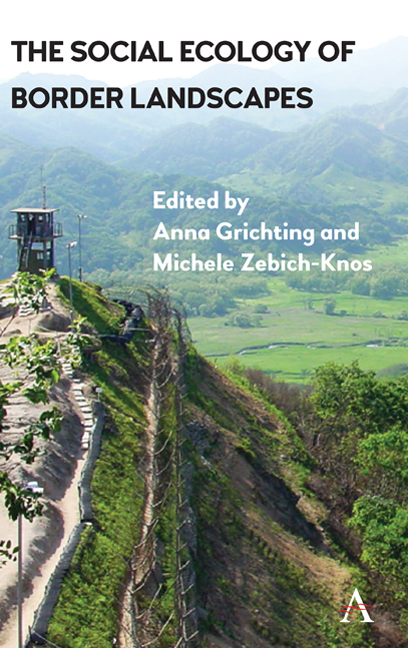Book contents
- Frontmatter
- Contents
- List of Illustrations
- Preface
- List of Contributors
- Introduction: Social Ecologies and Borderlands
- Part I FRAMES: MAPPING SOCIAL ECOLOGIES IN BORDER TERRITORIES
- Part II BRIDGES: RESILIENCE, RESTORATION AND RECLAMATION
- Part III CORRIDORS: CATALYSTS AND COLLABORATION IN CONFINED SPACES
- Chapter Eight Ensuring Hope in Militarized Landscapes: The Case of Lebanon
- Chapter Nine Domesticating and Enlarging One's Territory: Day-to-Day Politics in a Confined Space — The Shu'fat Refugee Camp in East Jerusalem
- Chapter Ten Urban Alternatives and Collaborative Economics in Belfast's Contested Space
- Part IV PORTALS: DIALOGUE, EXCEPTION AND RETERRITORIALIZATION
- Conclusion: Making Sense of Social Ecology, Borders and the Environment
- Index
Chapter Eight - Ensuring Hope in Militarized Landscapes: The Case of Lebanon
from Part III - CORRIDORS: CATALYSTS AND COLLABORATION IN CONFINED SPACES
Published online by Cambridge University Press: 10 January 2018
- Frontmatter
- Contents
- List of Illustrations
- Preface
- List of Contributors
- Introduction: Social Ecologies and Borderlands
- Part I FRAMES: MAPPING SOCIAL ECOLOGIES IN BORDER TERRITORIES
- Part II BRIDGES: RESILIENCE, RESTORATION AND RECLAMATION
- Part III CORRIDORS: CATALYSTS AND COLLABORATION IN CONFINED SPACES
- Chapter Eight Ensuring Hope in Militarized Landscapes: The Case of Lebanon
- Chapter Nine Domesticating and Enlarging One's Territory: Day-to-Day Politics in a Confined Space — The Shu'fat Refugee Camp in East Jerusalem
- Chapter Ten Urban Alternatives and Collaborative Economics in Belfast's Contested Space
- Part IV PORTALS: DIALOGUE, EXCEPTION AND RETERRITORIALIZATION
- Conclusion: Making Sense of Social Ecology, Borders and the Environment
- Index
Summary
Introduction
For the academic year 2010–11, I compiled and edited a book featuring the works of final-year students in the Department of Landscape Design and Ecosystem Management at the American University of Beirut (AUB). The title and cover page needed to capture the core theme that linked the 22 narratives and reflect the work methodology adopted for each project. While reviewing the pictures I had taken of the different locations, one image instantly caught my attention — a magnolia tree planted on the side yard of a tire repair shop, located along Beirut's notorious former Green Line. The image perfectly captured the research. The leafless tree had been efficiently used to hang tires. Upon rendering the image, I filled the tires with soil and allowed climbing plants to reclaim the space; Remodeling Harshscapes thus became the title of the book. The process of remodeling harshscapes adheres to Murray Bookchin's theory in social ecology that “nearly all our present ecological problems originate in deep-seated social problems.” Wars, protracted conflicts, internal political and sectarian divisions embody societal anxieties, which drop heavy shadows over the Lebanese landscape. Enclaves and gated zones, reminiscent of Hilary Cunningham's gated ecologies, manifest as postwar landscapes that produce an array of rigid and elastic borderlines and develop unique mechanisms to inject sustenance within every sclerotic setting.
This chapter studies two projects, designed and implemented by the Community Development Projects Unit (CDPU) at the American University of Beirut, that tackle militarized landscapes. The first project, titled Reclaiming the Traditional Water Conservation Practices in Rural South Lebanon — Case of Marwaheen Village, considers a South Lebanon village's ordeal in which farmers applied their deep-seated knowledge of local plains and gorges to sustain rootedness within an arid, ecological system that had been “assigned” as a war zone. The second project, titled Urban Agriculture — Women's Vocational Training Center — Ein El Hilwi Palestinian Refugee Camp, explores the aspirations of disenfranchised female groups. In a suppressed and gated environment, modest cultivation practices enabled the refugees to imprint upon the camp a landscape of hope for the future. I place the Marwaheen village project first, not for lack of recognition of the suffering incurred by the Palestinian refugees at Ein El Hilwi, but because Marwaheen lies near the Israeliborder and represents the true ironies of border life in a conflict zone.
- Type
- Chapter
- Information
- The Social Ecology of Border Landscapes , pp. 153 - 168Publisher: Anthem PressPrint publication year: 2017



